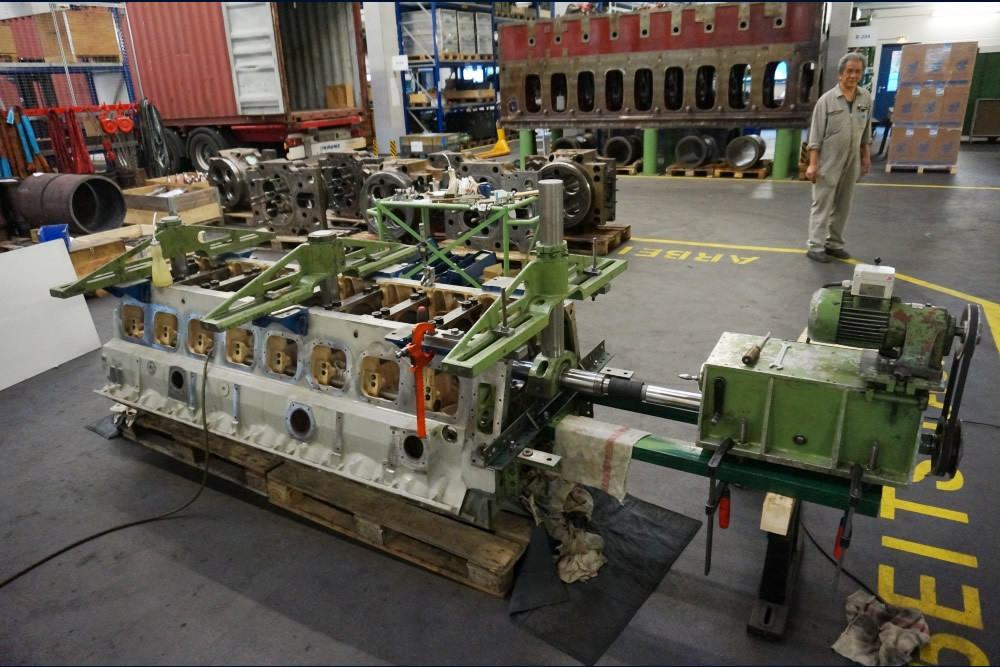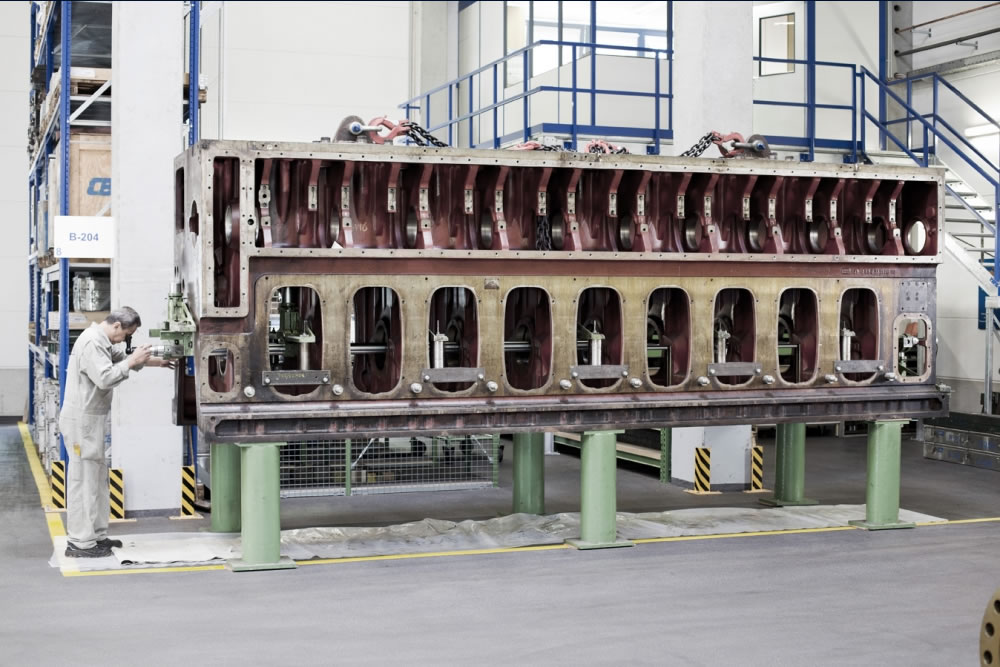Coaxial bearings are used in a wide range of applications where rotary motion is required, e.g. in internal combustion engines, compressors, steel presses and can-making machines. There are also many reasons why bearing bores can become damaged and misaligned, including overheating, excessive rpm and/or the influence of external forces. If the bearing clearances are too tight or too loose, or if the engine or plant is improperly aligned, the shaft may also be damaged, requiring corrective machining of the bearing bore. To perform these tasks, Carl Baguhn has developed a transportable line-boring system for in-situ machining of bearing bores: the B 204. Often copied – never equalled!
Carl Baguhn line-boring tools can be packed and dispatched in the space of a few hours. After arriving at your location, the required bearing bores will be machined in situ quickly, cleanly and with absolute precision. There is no need for costly disassembly and reassembly of the crankcase or other major components.
The globally renowned B 204 tool from Carl Baguhn is installed in-situ at your location with the aid of engine-specific adapters and optical alignment. Using an adjustable electric motor with feed drive, the machining speed can be accurately adjusted for bore diameters ranging from 100 to 1,000 mm. The Carl Baguhn tool offers absolute horizontal precision for all bore lengths between 1 and 18 metres. Carl Baguhn can thus guarantee the tolerances specified by the engine manufacturer.
The boring head, fitted with multiple cutting tips, is mounted on the boring bar and calibrated. The resulting bore is measured using a touch probe and checked with a micrometer. Tolerances are in the region of hundredths of a millimetre.
In order to bore an engine to the standard diameter, it is first necessary to create an artificial oval. Usually this is done in a workshop by machining the contact surfaces on the bearing caps. A much easier solution – which is also faster and more affordable in remote locations – is to use the mobile tool from Carl Baguhn. After machining the bearing caps on site, our engineers will then install them to specification.
Since Carl Baguhn developed the line-boring process in the mid-20th century, it has become widely used and highly valued around the world. Over the years, some 8,000 engines have been repaired using our process. This work involved specific data relating to 500 different engines or compressors from the following manufacturers:
ABC, Allen Diesels, B&W, Bergen Diesel, Bohn+Kähler, Bolnes, Brons, Caterpillar, Cockerill, Crepelle, Daihatsu, Deutz, Dujardin-Allen, English Electric, Fiat, Fuji Diesel, General Motors, GMT, Götaverken, Hanshin, Harland and Wolff, Jastram, Jenbach-Borsig, Kromhout, MTU, MWM, MaK, MAN, Mirrlees Blackstone, Mitsubishi, Mitsui, Niigata, NOHAB, Nordberg, Norm-Diesel, SEMT Pielstick, Russen-Diesel, Ruston, SWD, SKL, Smit-Bolnes, Sulzer, Wärtsilä, Waukesha, Wichmann, WUMAG, Yanmar, Atlas Copco, GHH, KSB, Linde, Mannesmann, MBH, Neumann & Esser, Wurzner, Zwickau and many more.
Any use by us of any engine manufacturer’s brand or model name, product codes, part numbers or IMO numbers is for descriptive and/or reference purposes only.
The Carl Baguhn line-boring process has been used around the world since the mid-20th century. From Europe, Africa and Asia to Australia and the Americas – no distance is too great for our service teams. Time is no obstacle either. Every hour of the day, every day of the year, our line-boring services are being deployed in a wide range of vessels and industries: ferries, cruise ships, container ships, tankers, bulk carriers, naval vessels, reefer ships, fishing trawlers, oil rigs, oil fabrication vessels, power stations at sea and on land, refineries, paper/fish/can factories and the offshore industry (for which Carl Baguhn technicians have the relevant safety qualifications).
Download our Workshop & Field Service Flyer:

